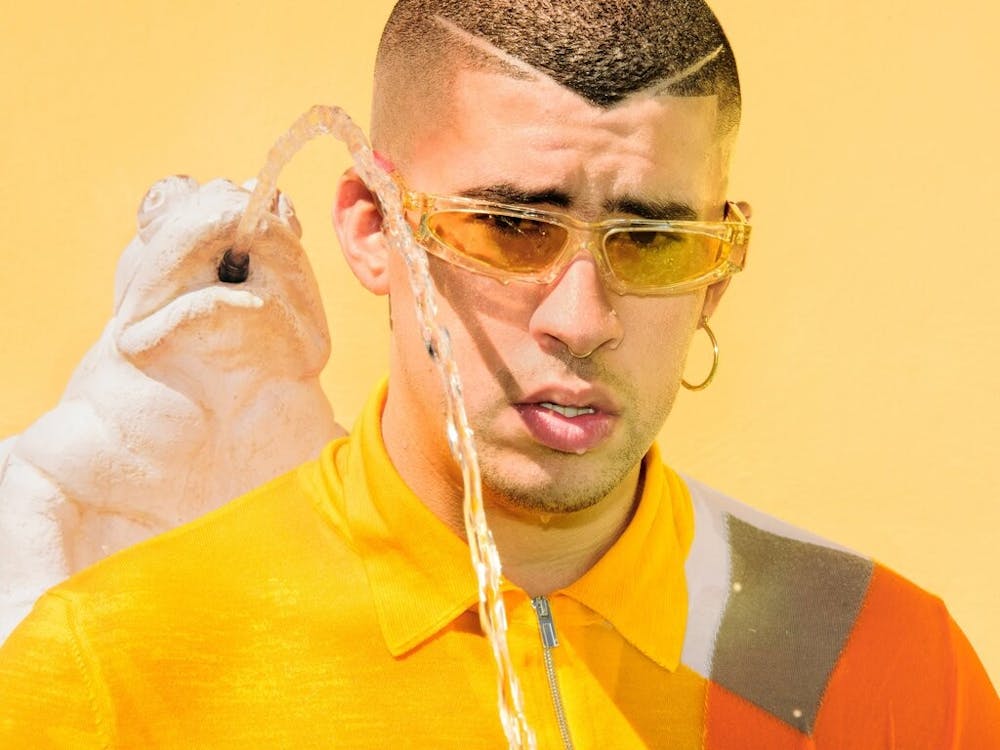This year shook our collective faith in the world we built and the artists we entrust with our time. Rap’s shortlist (Kendrick Lamar, J. Cole, Drake, Travis Scott) largely refused to release work in a tourless era, while opportunists such as Griselda (Westside Gunn (), Benny The Butcher, Conway the Machine) jumped on the chance to unleash deluges of rushed and unremarkable projects to a starved audience. In Griselda’s case, this meant slapping eight different covers on the same milquetoast album and hoping no one would notice.
In such an unforgivingly mediocre year of rap, two kings hold us close as we desperately try to avoid listening to Griselda say absolutely nothing for hundreds of minutes — Bad Bunny (Benito Antonio Martínez Ocasio) and Lil Baby (Dominique Armani Jones). Both have had storied years, transitioning from a position of excitement and conditional respect to true reverence, releasing record-shattering music and championing human rights as they go.
Bad Bunny was born into the Puerto Rican middle class to a truck driver and a retired school teacher. In college, he was signed to a label while bagging groceries. He was a clean-cut, flamboyant dresser with a booming voice and absolute command of whatever beat you put in front of him. He quickly became a staple of the reggaeton-trap crossover movement, infusing his very soul into every song.
With rapid stardom comes an eagerness to please, which plagued Bad Bunny’s debut album. This naïveté melted away with his first 2020 project, “YHLQMDLG (Yo Hago Lo Que Me Da La Gana — I Do What I Want)," which he released on leap day, Feb. 29. All over this project, Bad Bunny is at the very top of his game.
There is not one word on the project out of place, all coalescing into a beautiful soup of reggaeton, trap, bachata, salsa and rock into an enthralling sonic mosaic. He also displays a theretofore undeveloped emotional versatility, stops singing exclusively about sex and takes more risks than most artists take in their careers. (There is a beat switch every 45 seconds on the monolithic “Safaera.”)
True to the name of his album, Bunny spent the rest of the year doing exactly what he wanted to do. In Kendrick Lamar fashion, he released the fantastic tracks that did not make the final cut for his album as a separate project. He also became the only man other than Hugh Hefner to appear on the cover of Playboy magazine, threw an impromptu concert on top of a flatbed truck that drove through The Bronx and Washington Heights and just generally lived the life you would expect of a boundary pushing international star.
Lil Baby, on the other hand, does not have such a feel good story. After frequent arrests starting with a burglary at 12, Baby dropped out of the 9th grade and focused on hustling and staying alive. He spent some years in prison, had his sentence extended for defending himself against a racist white man and otherwise was targeted by a system designed for exactly not him.
Upon release, he started rapping as just another voice in the cacophony of SoundCloud’s prime, but was soon separated due to Young Thug’s tutelage and the incessant pace of his raps. He was grouped with fellow Thug protege Gunna, and in 2018 the two released “Drip Harder,” a scattered effort devoted to one upmanship and being financially irresponsible. It was clear that neither artist’s effect was maximized, despite the astounding commercial success.
Baby entered 2020 starving. He had nothing less than complete dominance on his mind, as he announced in the title of his phenomenal album “My Turn.” Here, Lil Baby fully comes into his own. His flow throughout the project is simply perfect. Like the X-Men villain Juggernaut, when Lil Baby gets going, there is no force on earth that can stop him. He is capable of rapping at a furious pace for minutes on end, existing within the soul of the beat, all the while connecting surprisingly weighty thoughts to punchlines and off-the-wall observations.
Further, his slightly raspy voice never loses a transcendental desperation that makes the album feel almost religious. The features that he allows are uniformly excellent, including two game-changing appearances from little-brother-to-all, 42 Dugg. One such collaboration, “We Paid,” is among the most celebrated tracks of the year, and could be billed as a self-contained portrayal of the soul of contemporary rap music.
Since releasing the deluxe version of “My Turn” was released, which includes the anti-brutality anthem “The Bigger Picture,” Lil Baby has been transfigured into an elder statesman of the rap game. His is the most sought after feature at the moment. He was right: it is his turn.
While these two men on the surface could not be more distinct, upon closer inspection they are two sides of the same coin. Both artists blew up thanks to Drake, were born in 1994 and have been bizarrely politicized. They exploded overnight with somewhat shallow content. Then, through collaborative albums, their self-confidence boomed, allowing them to reinvent themselves this year on landmark albums that displayed their mastery of flow and cemented their status as all-time greats.
Get The Chronicle straight to your inbox
Sign up for our weekly newsletter. Cancel at any time.

